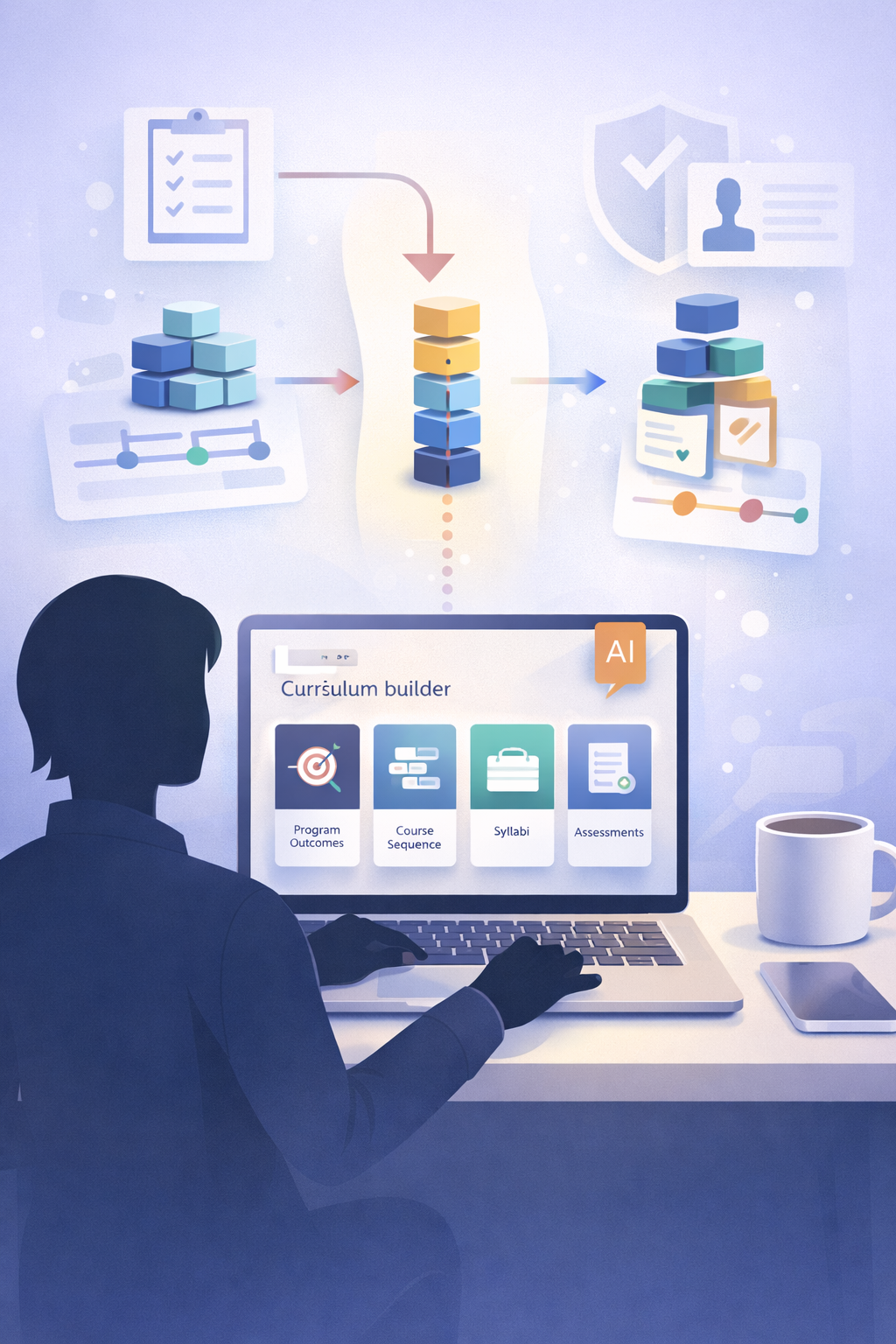AI-Powered Curriculum Development: How New Universities Can Build Accreditation-Ready Programs in Weeks, Not Months
Unlocking the Secrets to Launching Your Own Private Career School in New York: An Insider's Guide!

Are you passionate about education and dream of starting your own private career school in New York? The journey to establishing a successful educational institution can be both exciting and challenging. In this comprehensive blog post, we'll walk you through the step-by-step process of obtaining approval for a career school in New York, demystifying the regulations and requirements along the way. We'll explore the various stages of the application process, discuss the key components of a successful application, and provide you with a detailed checklist to ensure you have everything you need to make your dream a reality.
Determining Licensure Requirements
First, it's crucial to determine if your school falls under the licensure requirements set by the New York State Education Department. Most private career schools need to be licensed, but there are some exemptions. Picture yourself as an aspiring school founder, carefully reviewing Education Law Sections 5001(1) and 5001(2) to see where your vision fits in. These sections outline the types of schools that require licensure and those that may be exempt. For example, schools offering exclusively avocational or recreational courses, such as dance or martial arts, may be exempt from licensure. However, if your school will offer vocational programs designed to prepare students for employment, licensure is likely required.
The Application Process
Once you've confirmed that licensure is necessary, it's time to dive into the application process. Imagine logging into the BPSS (Bureau of Proprietary School Supervision) system through My.NY.gov, feeling a mix of excitement and nervousness as you begin to fill out the application. You'll need to gather a variety of information and documents, including details about your school, ownership structure, and supporting materials.
The application process consists of two main phases:
Phase 1: Application Requirements
In this phase, you'll have 180 days to submit all the requested documentation and secure preliminary approval for your proposed curricula. It's like a ticking clock, pushing you to stay organized and efficient in collecting and submitting the necessary paperwork. Some of the key documents you'll need to provide include:
- School information: Name, address, contact details, and type of school (private career or ESL)
- Ownership information: Ownership type, owner's name and address, and stakeholders' information
- Supporting documents: Consent from the Education Department's Office of Counsel, Certificate of Incorporation, and other ownership-related documents
- Administrative forms, enrollment agreement, and school catalog
- Curriculum applications and supporting documents
- Personnel licenses and supporting documents for the director, agents, and teachers
- Financial documents: Bank statements, operating budget, balance sheet, and audited financial statements
- Quarters documents: Lease/mortgage agreement, certificate of occupancy, fire safety inspection, and health department approval (if applicable)
It's essential to be thorough and accurate when submitting these documents, as any deficiencies or inconsistencies could delay the approval process.
Phase 2: Evaluation
In Phase 2, BPSS will evaluate your application against minimum criteria in five key areas:
- Ownership: BPSS will review your ownership structure, ensuring that you have the legal authority to operate in New York and that your educational purpose aligns with the state's requirements.
- Educational Policies and Operations: Your administrative forms, enrollment agreements, and school catalog will be scrutinized to ensure compliance with regulations and demonstrate your understanding of the laws governing private career schools.
- Personnel: BPSS will verify that your director, agents, and teachers hold the necessary licenses and meet the qualifications required for their respective roles.
- Financial Viability: Your financial documents will be evaluated to ensure that your school has the resources and stability to provide a quality education. BPSS will review your bank accounts, operating budgets, balance sheets, and audits to assess your financial health.
- Quarters: Your school's facilities will be inspected for compliance with use, occupancy, fire safety, and educational suitability standards. BPSS will ensure that your campus meets the necessary requirements to provide a safe and effective learning environment.
Throughout the evaluation phase, BPSS may request additional information or clarification. It's important to respond promptly and thoroughly to any such requests to keep the approval process moving forward.
Curriculum Development
Curriculum development is a critical component of the application process. Whether you're following mandated curricula, partnering with nationally recognized vendors, or crafting your own school-defined programs, each path has its own set of requirements and approval processes. Envision your team of educators and subject matter experts working diligently to create engaging, compliant curricula that will inspire and empower your future students.
When developing your curricula, consider the following factors:
- Entrance standards: Ensure that your curricula have clear entrance requirements that demonstrate students possess the necessary skills and prerequisites to succeed in the program.
- Content: Your curricula should provide students with the knowledge and skills required for employment in the relevant occupational area.
- Instructional methods: Incorporate appropriate instructional methods that effectively deliver the content and engage students in the learning process.
- Equipment: Ensure that your instructional equipment aligns with industry standards and is suitable for preparing students for the demands of the workplace.
Seeking Expert Guidance
Throughout the application process, you may encounter unfamiliar terms and complex regulations. Don't hesitate to seek guidance from experts in the field, attend workshops and webinars, and connect with other school founders who have successfully navigated the approval process. It's like having a team of experienced guides, helping you map out the best route to your destination.
The Approval Checklist
To help you stay organized and ensure you have all the necessary components for your private career school application, here's a comprehensive checklist:
1. School Information:
- School name, address, and contact information
- Type of school (private career or ESL)
- Title IV approval status (if applicable)
2. Ownership Information:
- Ownership type (LLC, LLP, Corporation, Sole Proprietor, Partnership)
- Owner's name and address
- Stakeholders' information (top 8 stakeholders)
3. Supporting Documents:
- Consent from the Education Department's Office of Counsel
- Certificate of Incorporation and filing receipts
- Certificates, agreements, or other relevant documents based on ownership type
- Administrative forms, enrollment agreement, and school catalog
- Curriculum applications and supporting documents
- Personnel licenses (director, agent, teachers) and supporting documents
- Financial documents (bank statements, operating budget, balance sheet, audited financial statements)
- Quarters documents (lease/mortgage agreement, certificate of occupancy, fire safety inspection, health department approval if applicable)
4. Disclosure Questions:
- Answers to disclosure questions and explanations for any "Yes" responses
5. Payment:
- Non-refundable application fee of $5,000 for a new school or $2,500 for an additional location (paid via credit card, cashier's check, or US Postal money order)
6. Additional Items:
- Agent application and fee ($200)
- Director application and fee ($100)
- Teacher applications and fees ($100 each)
- Curriculum applications and fees ($100-$250 each)
Closing Thoughts
Starting a private career school in New York is a significant undertaking, but with careful planning, attention to detail, and a commitment to excellence, you can turn your vision into a reality. As you progress through each stage of the approval process, keep your ultimate goal in mind: creating a transformative educational experience for your future students.
Remember, the journey to establishing a successful private career school is not a sprint, but a marathon. It requires patience, perseverance, and a willingness to learn and adapt. By staying organized, seeking expert guidance, and maintaining a focus on compliance and quality, you'll be well on your way to unlocking the doors to your very own educational institution.
As you embark on this exciting venture, take pride in knowing that you're not just building a school, but creating opportunities for countless individuals to acquire the skills and knowledge they need to succeed in their chosen careers. Your dedication and hard work will have a lasting impact on the lives of your students and the communities they serve.
So, roll up your sleeves, dive into the application process, and let your passion for education guide you every step of the way. With the right approach and a commitment to excellence, you'll soon be welcoming eager students through the doors of your very own private career school in New York.
For personalized guidance, feel free to reach out to Expert Education Consultants via email at info@experteduconsult.com with any questions you may have. This service is complimentary.
To explore customized solutions tailored to your specific needs, schedule a personalized one-on-one paid consultation with Dr. Sandra Norderhaug here.











